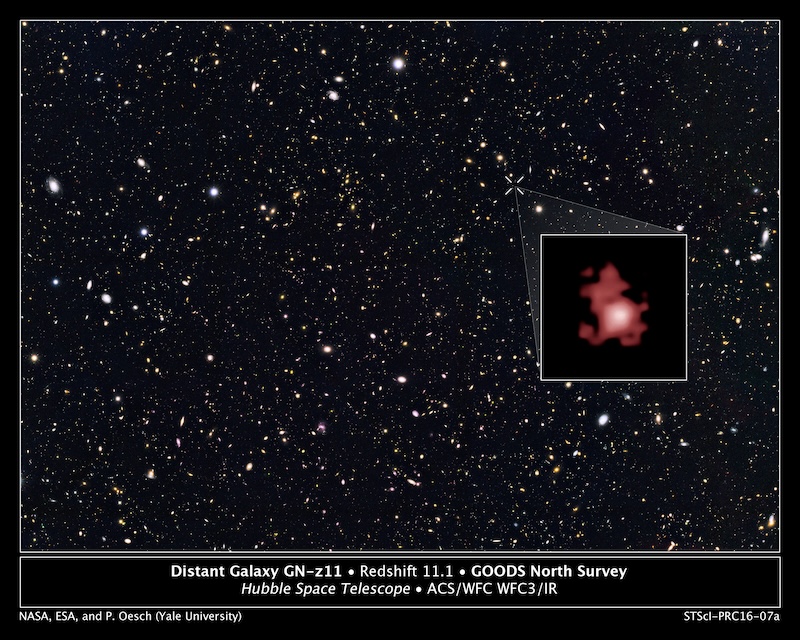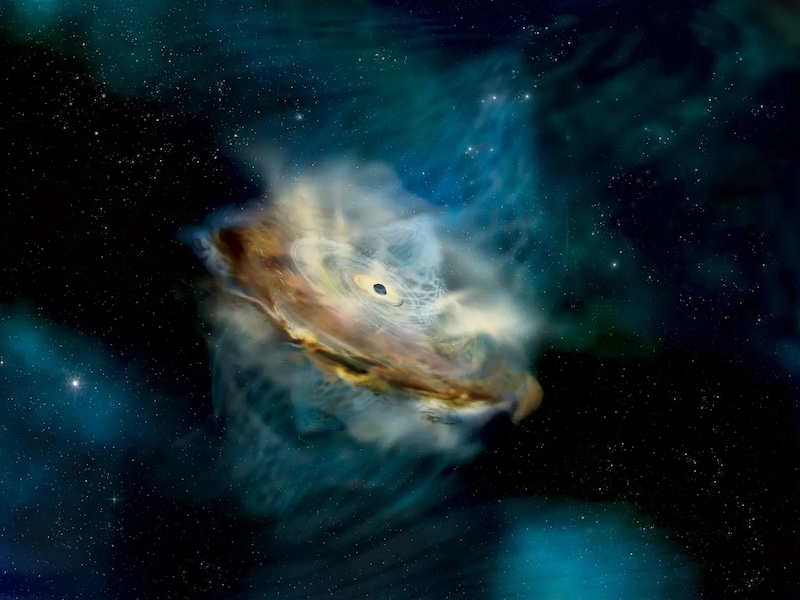An international team of astronomers said on January 17, 2024, that it has discovered a new candidate for the oldest-known black hole. They said it was over 13 billion years old, nearly as old as the universe itself, according to modern theories. It appears to date back to only 400 million years after the Big Bang. They said this black hole is “eating” its host galaxy, devouring material to help it grow. Nothing new there. Black holes in the early universe are hungry in that way! But the researchers also said that this black hole is more massive than expected for existing so early in the history of the universe.
The researchers, led by the University of Cambridge in the U.K., published the peer-reviewed details of their discovery in Nature on January 17, 2024. The paper is also available as a preprint on arXiv.
EarthSky lunar calendars are back in stock! And we’re guaranteed to sell out, so get one while you can. Your support means the world to us and allows us to keep going. Purchase here.
Oldest-known black hole
The black hole resides in the center of the young galaxy GN-z11. This is similar to how supermassive black holes are typically found in the centers of galaxies. But it’s unusual to see a massive black hole in a galaxy still so young, only a few hundred million years old. While the black hole may be relatively small size-wise, it is extremely massive, a few million times more massive than our sun. Lead author Roberto Maiolino at the University of Cambridge said:
It’s very early in the universe to see a black hole this massive, so we’ve got to consider other ways they might form. Very early galaxies were extremely gas-rich, so they would have been like a buffet for black holes.
To be clear, astronomers are seeing the oldest known black hole as it existed over 13 billion years ago. That’s counting back from the present day, our time. But that means that at that time, the black hole was actually still young. We are seeing it as it existed only 400 million years after the Big Bang. On a cosmic timescale, it was still a baby. The universe was only 3% of its current age.


Black hole is devouring its galaxy
Black holes consume gas and other material around them, helping them to grow. And this one is no different. But the astronomers also said that this black hole has a huge appetite, much more than older black holes. But that may also be detrimental, as it may be eating too much. If a black hole consumes too much gas, it will start to push the gas away from it instead.
The gas moves away in a super-fast “wind.” That wind can hamper star formation in the host galaxy. This is destructive not only to the galaxy, but the black hole itself. Why? Because it effectively kills off the black hole’s food supply. So by eating too fast, the black hole is also ensuring its own fate.
The host galaxy, GN-z11, is also young, and on the small side as galaxies go. It is about 100 times smaller than our Milky Way. Like with other galaxies, this supermassive black hole is at its center. However, this also poses questions. According to current understanding of how black holes form, it should take around a billion years for it to become as massive as it is. But as already noted, both the galaxy and black hole are only about 400 million years old. So how did it get so massive?
A new era
Astronomers expect that Webb will be able to find more black holes that are even older. And as Maiolino also noted, Webb is taking us into a new era:
It’s a new era: the giant leap in sensitivity, especially in the infrared, is like upgrading from Galileo’s telescope to a modern telescope overnight. Before Webb came online, I thought maybe the universe isn’t so interesting when you go beyond what we could see with the Hubble Space Telescope. But that hasn’t been the case at all: the universe has been quite generous in what it’s showing us, and this is just the beginning.
Bottom line: Astronomers have discovered the oldest known black hole. It dates back more than 13 billion years, to when the universe was only 400 million years old.
Source: A small and vigorous black hole in the early Universe
Source (preprint): A small and vigorous black hole in the early Universe
Via University of Cambridge
Read more: Closest black holes yet in famous Hyades star cluster?
Read more: 1st image of a black hole … now new and improved!